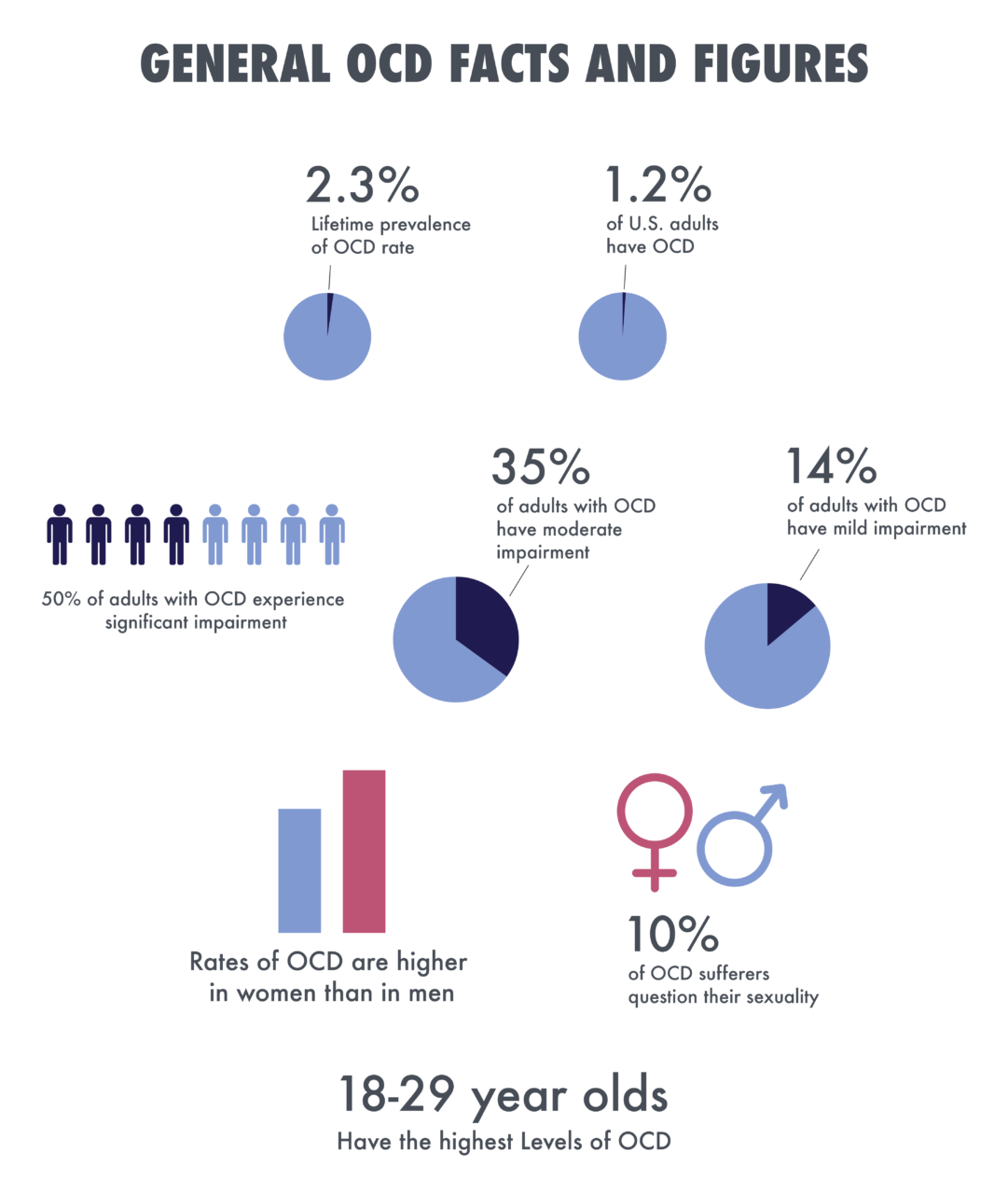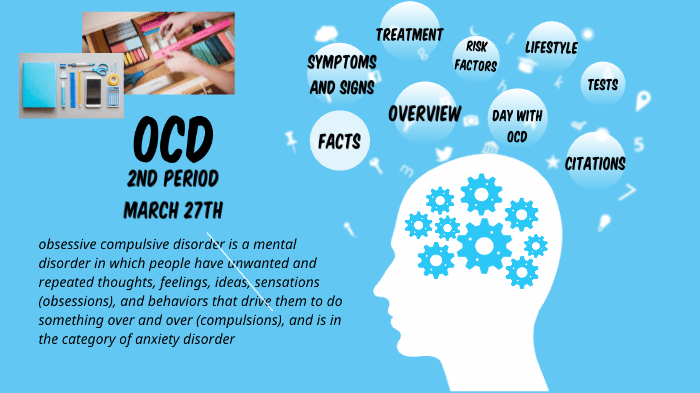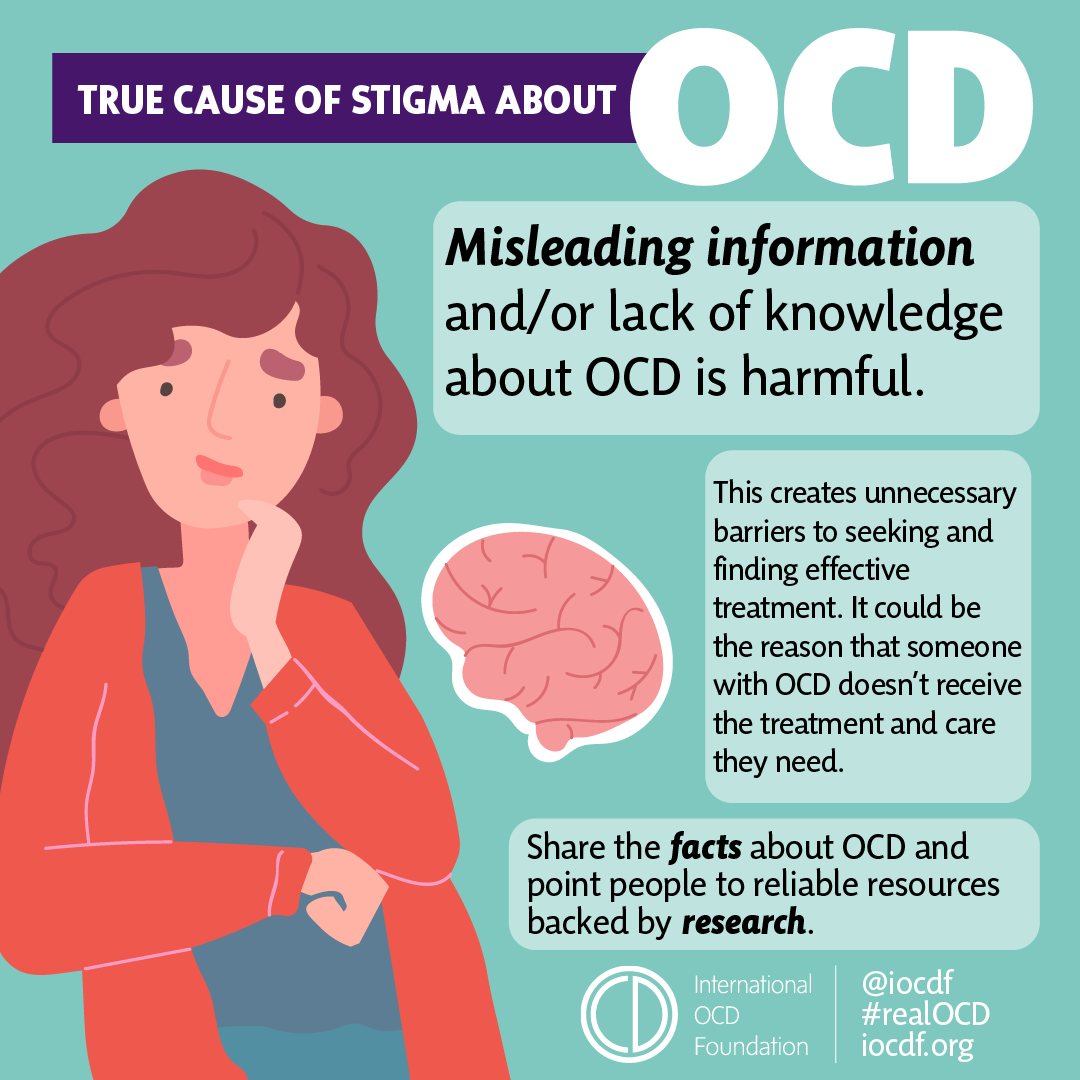Obsessions are unwanted, intrusive thoughts, urges or images, the presence of which generally causes marked discomfort or anxiety. The dominant theme of intrusive thoughts may be harm or risk to self and others, contamination, doubt, symmetry, or aggression. For example, patients may be haunted by thoughts of contamination by bacteria through dirt if they do not wash their hands every (≥) 2 hours or more frequently. Obsessions are unpleasant for the patient. Therefore, patients usually try to ignore and/or suppress these thoughts, urges, or images. Or neutralize them by committing compulsions.
Compulsions (often called "rituals") are excessive, repetitive, purposeful types of behavior that patients feel an urgent need to follow in order to prevent or reduce the anxiety caused by obsessive thoughts or to neutralize the obsessive thoughts themselves. Examples:
Washing (e.g., washing hands, taking a shower)
Checking (e.g., turning off the stove, locking doors)
Counting (e.g., repeating a certain behavior a certain number of times)
Arranging (e.g., organizing the work table or kitchen utensils in a certain pattern)
Most rituals, such as washing hands or checking locks, are obvious, but some rituals, such as quiet counting or saying to yourself under your breath, are not noticed by those around you. Usually, compulsive rituals must be performed in a certain way according to strict rules. Rituals may or may not be really related to the fear-mongering event. If they are indeed related (e.g., washing to be clean, checking the stove to prevent a fire), then the compulsions are clearly excessive: for example, the patient showers for many hours every day or checks 30 times before leaving the house to see if the stove is off. In all cases, the obsessions and/or compulsions must be time-consuming (e.g., >1 hour/day, often much more) or cause patients significant discomfort or difficulty in various activities; in their most extreme forms, the obsessions and compulsions can lead to disability.
The degree to which patients understand their own problems varies. Most people with obsessive-compulsive disorder (OCD) recognize to varying degrees that the beliefs underlying their obsessions are unrealistic (e.g., that they would not actually get cancer if they touched an ashtray). However, sometimes understanding is completely absent (i.e., patients believe that the beliefs underlying their obsessions are true and that their compulsions are reasonable).
People with this disorder may fear embarrassing situations or social judgment, so they often hide their obsessions and rituals. Relationships may be damaged and school performance or productivity at work may decline. Depression is a common secondary sign.
What are the causes of OCD?
Many factors can play a role in the onset of OCD. One or more of the following may explain why you or someone you know has OCD.
In some cases, OCD is hereditary, so sometimes the disorder can run in the family.
Stressful life events cause OCD in about a third of all cases.
Life changes in which you have to take on more responsibility, such as puberty, having a baby, or a new job.
If you have OCD and it has been going on for some time, you may develop an imbalance of serotonin (also known as 5HT), a brain neurotransmitter.
You are a neat, pedantic, methodical person - but you go too far in this.
If you have extremely high standards of morality and responsibility, you may feel particularly bad about having unpleasant thoughts. To the point where you will begin to be wary and watch out for them, and that will make them even more likely to appear.



EXECUTIVE SUMMARY The Case study was conducted at Celso G. Mandocdoc (CGM) poultry farm. It is located at Barangay Tugtog and Sabang, San Jose Batangas. The proprietor, Mr. Celso G. Mandocdoc has been involved with the poultry egg industry for twenty four years and has …
Informative Speech Outline Obsessive Compulsive Disorder I. Attention Getter A. Show Obsessive Compulsive Disorder clip from you tube. http://www. youtube. com/watch? feature=player_embedded&v=sZYRVwjv1ws II. Background A. 1 out of every 100 adults suffers from Obsessive-Compulsive Disorder, and even more are affected by its symptoms. B. Living …
Brain Hiccup Obsessive-compulsive disorder (OCD) is a type of anxiety disorder that is characterized by obsessive thoughts and compulsive behavior. OCD is an illness that really makes an impact in the lives of the people. This disorder traps its victims in endless cycles of repetitive …
In Germany, psychiatrists regarded OCD as a disorder of intellect. The German word for “obsession” is Zwangsvorstellung and was translated as “obsession” in Great Britain and “compulsion” in the United States. The term “obsessive-compulsive disorder” became the compromise term. Over time, the way people view …
A Case Study of Obsessive-Compulsive Disorder: Some Diagnostic Considerations INTROD UCTION Prior to 1984, obsessive-compulsive disorder (OCD) was considered a rare disorder and one difficult to treat (I ) . In 1984 the Epidemiologic Catchment Area (ECA) initial survey results became available for the first time, and OC D prevalence figures showed that 2. 5 % of the population m et diagnostic criteria for OCD (2,3) . Final survey results published in 1988 (4) confirmed …
Obsessive-Compulsive Disorder (OCD) is a psychiatric disorder with a biologic basis. It includes intrusive thoughts (obsessions) and repetitive rituals (compulsions). The obsessions produce anxiety while the compulsions reduce anxiety. Anxiety is defined as a “hyperalert state causing excessive autonomic arousal and diminished coping” (1). The …
Introduction Throughout history, our conceptualization of obsessive compulsive disorder (OCD) has been changing alongside changes in the way we have viewed the world. With the dawning of the Renaissance in Western Europe, religious explanations based on demonic possession were superseded by a more humanistic understanding. …
Obsessive-compulsive disorder, OCD, as defined by the National Institute of Mental Health is an anxiety disorder that is distinguished by persistent, unwanted thoughts and/or compulsions (“NIMH,” 2007). OCD is one of the most expensive and persistent forms of psychopathology. Although OCD has been thought of …
John Smith is a 25-year-old male with Obsessive Compulsive Disorder (OCD). Aside from having OCD, he is a fairly healthy male, with a long living family. He has a moderate number of friends, with a few close friends. He and his family are on positive …
Symptoms: Intrusive thought; Compulsive behavior
Save time and let our verified experts help you.
Hire writer